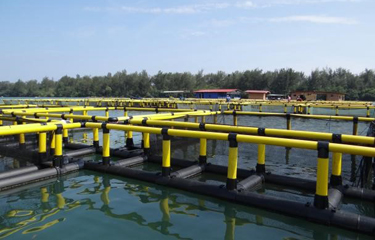Guangxi, China-based Hiseaton Foods, which operates Brunei’s first large-scale fish farming enterprise, continues to expand its operations as it seeks to take advantage of a “very good environment” for offshore aquaculture, according to the company’s chief executive officer.
The company, also known as Haishitong Fishery, established its Brunei operations in June 2016 through local subsidiary Hiseaton Fisheries Sdn Bhd. Bruneian waters are clean, and the company has been able to obtain both fishing and aquaculture permits from the government, which sees the company’s efforts as in line with its Vision 2035 program to increase local incomes and living standards. As a result of that program and the Bruneian government's close cooperation with China, the company has obtained exclusive government permits to farm and fish in a 2,000-hectare zone off the coast of Brunei.
Hiseaton is currently farming golden pomfret (pompano), goldeneye perch (barramundi), and various types of groupers in the permitted area. In 2019, Hiseaton had 23 net-pen cages in operation, but even with complications caused by the COVID-19 pandemic, the company now operates 158 net-pen cages of various sizes, including 24 cages with a volume of 6,000 cubic meters of water and smaller cages sized at 800 cubic meters and 150 cubic meters, all constructed from HDPE.
Hiseaton has also set up what it describes as Brunei’s first hatchery for barramundi fish fry, which Hiseaton CEO Cherry Wei said is mainly focused on supplying the domestic market.
“The fish fry were supplied to many local fisheries companies, reducing the dependence on imports. It’s a major breakthrough for the development of Brunei fisheries,” Wei told SeafoodSource.
Additionally, Hiseaton also has a halal-certified processing plant in Brunei and exports to North America and to Australia. The company is waiting for the final procedures to be put in place for shipment of fish into China. While Brunei is a member of the Association of Southeast Asian Nations (ASEAN), which has a free trade agreement with China, it has taken several years for a protocol to be negotiated for seafood trade access to the Chinese market.
“We hope that the high-quality marine fish raised in Brunei can be exported back to China as soon as possible,” Wei said.
But though the company registered early profits, Hiseaton’s path forward is not entirely smooth, according to Wei, with operating in Brunei proving to be a “high-risk and exploratory undertaking” Wei said. The company has had to monitor passing vessels in Brunei's offshore waters that may cause damage to the breeding facilities. And there is also the bigger question of energy exploration in the area, according to Wei.
“The water in the nearshore breeding area is very shallow, and the water quality is not ideal in the rainy season,” Wei said. “What is [most] worrying is whether Brunei’s oil extraction activities will pollute the coastal aquaculture areas and affect the development of Brunei’s fisheries.”
Wei said Hiseaton’s emphasis on staff protection ensured none of its employees contracted the coronavirus, but that the COVID-19 pandemic still brought challenges, with rising shipping freight costs making it expensive to export fish out of Brunei and to bring materials into the country. Wei said that, as a result, the company has had difficulty getting sourcing hardware for its expansion projects and therefore, that its costs “increased significantly” and production plans were postponed.
“The cost of ocean freight soared during COVID and shipping containers were hard to find, meaning it was difficult to get our exports out as scheduled,” Wei said. “[Separately], almost all of our materials are imported, which has caused many plans to be delayed longer than expected.”
The delays have not scared off the company from putting down roots locally. It recently signed a cooperative agreement with Brunei University and the Brunei University of Technology to develop future employees, a move that could mean more fisheries development in Brunei, given Hiseaton also has cooperative agreements with the Chinese Academy of Fishery Sciences and the Ocean University of China.
“We provide local college students in Brunei provide internship bases and employment opportunities, and provide technical training services for local fishery companies,” Wei said.
Despite all the effort Hiseaton has put into making its aquaculture project in Brunei work, Wei said it is still not guaranteed to pay out.
“Only through practical aquaculture practice can we understand the true nature of the sea area and know if it’s suitable for particular species,” Wei said.
Photo courtesy of Hiseaton Fisheries Sdn Bhd







